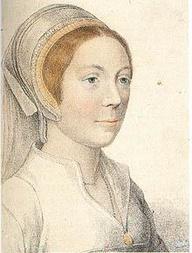 On 2nd November 1541, Archbishop Thomas Cranmer left a letter for Henry VIII in the Holy Day Closet at Hampton Court Palace detailing Catherine Howard’s colourful past, and how she had “lived most corruptly and sensually”. Cranmer had been persuaded by Chancellor Audley and the Earl of Hertford to relate the story told by Mary Hall to her brother, John Lassells.
On 2nd November 1541, Archbishop Thomas Cranmer left a letter for Henry VIII in the Holy Day Closet at Hampton Court Palace detailing Catherine Howard’s colourful past, and how she had “lived most corruptly and sensually”. Cranmer had been persuaded by Chancellor Audley and the Earl of Hertford to relate the story told by Mary Hall to her brother, John Lassells.
Here is what the Privy Council reported to William Paget, the ambassador in France, regarding the matter:
“Whiles the Kings Majestie was in his progresse oon John Lossells came to the said Archebisshopp of Canterbury and declared unto him that he had ben with a suster of his maryed in Sussex which some tyme had ben servant with thold Duchesse of Norfolk who did allso bring upp the said Maistres Katheryn, and being with his said sister chaunced to fall in comunycacon with her of the Queen, wherein he advised her (bicause she was of the Queen’s old acquaintaunce) to sue to be hir woman; whereunto his sister answered she wold not soo doo, but she was very sorry for the Queen.
Why q, Lossell; Mary q, she, for she is light both in living and in condytions. How so q, Lossell ; Marry quoth she there is oon Fraunce Derram who was servant also in my Lady of Norff howse, which hath lyen in bed with her in his doublet and hoose bitwen the shete an hundred nights, and there hath ben such puffing and blowing bitween them that once in the howse a mayde wch laye in the house with her said to me she wold lye no lenger with her, bicause she knew not what matrymonye ment. And further she said unto him that one Mannock, somtyme also servant to the said Duchess, knew a privie marke of hir body. When the said Lossells had declared this to the said Archebisshop of Canterbury, he considering the weight and importance of the matter, being mervelously perplexed therewith, consulted in the same with the Lord Chauncelor of Englande and the Earl of Hertford, whom the Kings Majestie going on his progresse left to reside at London to ordre his affayres in those pties; who having weighed the mattier and depely pondered the gravity thereof, wherewith they were greately troubled and unquieted, resolved finally the said Archbusshopp of Cant should reveal the same to the Kings Majestie; which because the matter was such as he both sorrowfully lamented and also cound not find in his harte to express the same to the Kings Majestie by word of mouthe he declared thinformacon thereof to his Hieghness in writing.
Whenne the Kings Majestie had red this information thus delyvered unto him, his Grace being much perplexed therwith, yet neverthelesse soo tenderly loved the woman and had conceyved suche a constant opinion of her honesty that he supposed it to be rather a forged mattier than of truthe. Wheruppon it pleased him secretely to call unto him the Lord Privie Seale, the Lord Admirall, Sir Anthony Browne, and Sir Thomas Wriothesley, to whom he opened the case, saying he coulde not beleve it to be trewe, and yet seing thinformacon was made he coulde not be satisfied tyll the certenty therof were knowen, but he wold not in anywise that in thinquisition any sparke of scandal shuld ryse towarde her. Wheruppon it was by his Majesty resolved that the Lorde Privie Seale shulde goo straight to London wher the said Lossell that gave the information was secretely kept, and with all dexteritie to examine and try whither he wolde stande to his sayeng.”
So, the King’s reaction to Cranmer’s letter was to order an investigation to prove the allegations to be “a forged matter” rather than the truth. Henry just could not believe that Catherine could have such a colourful past.
Notes and Sources
- Proceedings and Ordinances of the Privy Council of England, Volume VII, edited by Sir Harris Nicolas, p353-354